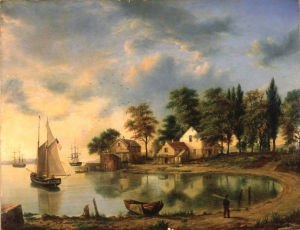The Brouwer Genealogy Database includes a profile of William Goulding/Goulder whose grandson, Joseph Goulder, married Hannah Daws who in turn had previously been the wife of Derck Brouwer, son of Jan Brouwer and Jannetje Jans. Although this correction does not effect the descendants of Derck Brouwer, it should still be addressed as the notion originated with a published account of William Goulder.
The correction is in regards to the possible son of William, named Jacob (or Yacum) by Richard W. Cook in, "The Golder Family," published in the Genealogical Magazine of New Jersey in volumes 29 and 30. In volume 29, at page 51, Cook suggests that Jacob Gouldt who with his wife Jannetje Cousart, had a son, Frans, baptized at the New York Reformed Dutch Church on 29 November 1691, is possibly a son of William Goulder. Further research is conclusive in demonstrating that Jacob "Gouldt" is not a son of William Goulder, but is instead Jacobus Goelet who was a school-master in New York City and later a book-seller and stationer.
Jacobus Gouleth, j.m., Van Buyck Sloot, and Janneken Cocher, j.d., Van N. Yorck, both living there (New York) had marriage banns published 28 December 1687 at the New York Reformed Dutch Church. They were married on 10 January 1688. The couple had ten children baptized at the New York Reformed Dutch Church between 1689 and 1708. In the baptism records, Jacob's surname is variously spelled as Goulet (1689-1696) Gouldt (just once, 1691, the record referred to by Cook, and this may simply be a typo or transcription error with e misunderstood or mistranscribed as d), and Goelet (1699-1708). Janneken's (or Jannetje's) surname varies as Sozard (1689 and just this once), Cousart (1691, 94), Coussaert (1696), Cosaer (1699, 1701), and Cosaar (1700, 02, 04, 08). She has been identified as the daughter of Jacques Casjou whose surname appears in numerous records from this period with varied spellings too numerous to go through here, but among them, Cousart. Her mother was Lydia Willems who appears as a witness for the baptism of Janneken's first child (Jacob) in 1689. I have not looked into Lydia Willems ancestry. All of the ten baptisms include names of witnesses (sponsors) and none are named Goulding/Goulder, nor do any appear to be associated with members of the Goulding family. Many of the witnesses' names do repeat, but they appear to more likely be close friends and associates of Jacob Goelet, rather than relations. That is the impression I get anyway, and perhaps someone with a greater interest in this family would prefer to research this further.
The will of Jacob Goelet of New York City, stationer, shopkeeper, "and now in good health," was written 15 September 1722. It was proved 2 September 1731 and is found in New York Wills 11:167. In his will, Jacob mentions his wife, "Janitie," and five children, Jacob, Jan, Raphael, Aefie and Phillipus. The abstract is found in New York (County) Surrogate's Court. Abstracts of Wills on File in the Surrogate's Office, City of New York (Vol. III 1730-1744). Collections of the New York Historical Society. New York: Printed for the Society, 1894): 37. Here the editor notes (38-9) that Jacob Goelet's place of business in New York was called the "Sign of the Bible," and also his dwelling place was located at what is now Hanover Square directly opposite 114 Pearl Street. And that "for many years before his death (was) the clerk of the Dutch church, and the records of baptism, etc. are in his handwriting." With this, I would suggest that Jacob's surname is most accurately, Goelet.
In short, Jacob Gouldt, actually, Jacob Goelet, the father of a son Frans who was baptized 26 November 1691, is not a son of William Goulding/Goulder. Whether or not William Goulder did have a son named Jacob (or Yacum) as per Cook, who may be found elsewhere, is something I have not investigated and cannot comment on one way or the other.
BGB 696
